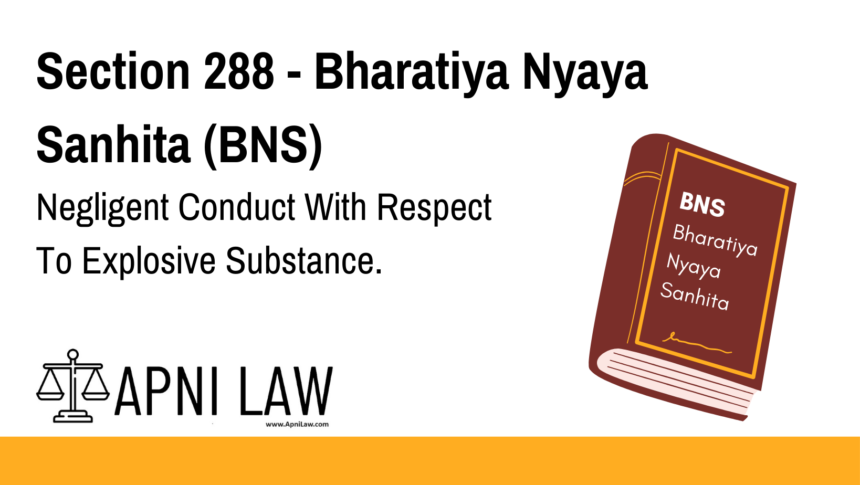Code: Section 288 BNS
Whoever does, with any explosive substance, any act so rashly or negligently as
to endanger human life, or to be likely to cause hurt or injury to any other person, or
knowingly or negligently omits to take such order with any explosive substance in his
possession as is sufficient to guard against any probable danger to human life from that
substance, shall be punished with imprisonment of either description for a term which may
extend to six months, or with fine which may extend to five thousand rupees, or with both.
Explanation of Section 288 BNS
Section 288 of the Bharatiya Nyaya Sanhita (BNS) focuses on negligent or rash conduct involving explosive substances. This section aims to prevent accidents that could result from careless handling, storage, or failure to secure explosives, which can pose serious risks to human life and property.
Key Points:
- Rash or negligent acts with explosive substances that can cause harm.
- Failure to take proper precautions to secure explosive materials, leading to potential dangers.
The law recognizes the inherent risks associated with explosive substances and stresses the importance of strict safety measures in their handling.
Illustration
Example 1: Mishandling of Explosive Materials
A construction worker carelessly handles dynamite without following safety protocols. An accidental explosion injures several people. The worker may be prosecuted under Section 288 BNS for negligent conduct.
Example 2: Inadequate Storage of Explosives
A person storing fireworks in an unsecured area near a residential building causes an accidental blast, leading to injuries. This individual can be charged under Section 288 BNS.
Common Questions and Answers on Section 288 BNS
1. What types of substances are covered under Section 288?
- Answer: It applies to all explosive substances, including dynamite, fireworks, gunpowder, and any other materials capable of causing explosions.
2. What does “negligent conduct” mean under Section 288?
- Answer: It refers to careless actions such as improper handling, unsafe storage, or failure to implement safety measures with explosive materials.
3. What are the punishments under Section 288?
- Answer: The punishment includes imprisonment for up to six months, a fine up to five thousand rupees, or both.
4. Does intent to harm matter under Section 288?
- Answer: No, this section focuses on negligence rather than intent. Even if harm was not intended, negligent actions that pose a risk to human life are punishable.
Conclusion
Section 288 BNS is crucial for ensuring the safe handling of explosive substances. It holds individuals accountable for negligent acts that can result in serious accidents, thus promoting a culture of safety and responsibility in dealing with hazardous materials.








